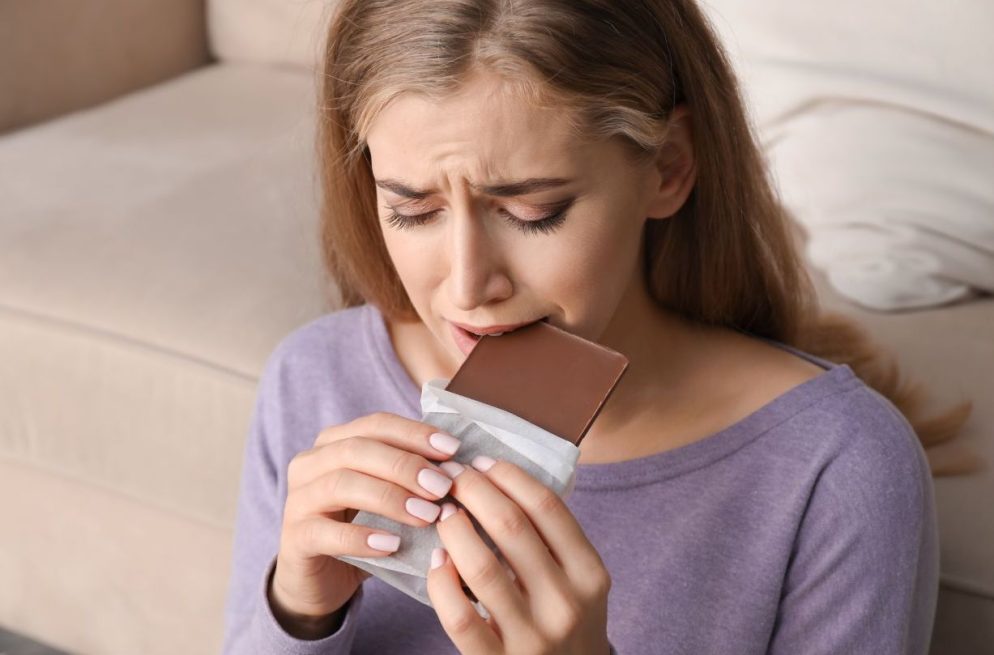We have plenty of suggestions on this blog and on our website for boosting your mood. The other side of the coin, however, are the behaviors and foods to avoid for mental health.
Spoiler alert: there is often an overlap between foods you should avoid, and foods we consider “comfort foods”. The sweet treats we turn to first when a low mood hits may be making your mood struggles more difficult in the long run.
Interestingly enough, it just so happens that the worst ingredient for your mood is also damaging to your immune system. You can raise the baseline of both your mood and your immune function just by leaving out this one ingredient from your diet…
Sugar
This is the BIG ONE. There really isn’t much in the “pros” column to say about added sugar, aside from its taste. You already know it’s not good for you. Here are two more reasons to avoid refined suagr: it’s bad for your mood and your immune function.
Sugar is inflammatory and causes added oxidative stress. Even one, single meal that significantly raises blood sugar (e.g. white bread, white flour, and other foods high in added sugars) can increase the production of inflammatory proteins that negatively affect immune function [1].
Plus, when you do get sick, high blood sugar levels can inhibit the response of immune cells that are necessary for getting better [2].
Furthermore, high blood sugar levels may harm both the function of the gut barrier and cause dysbiosis of the microbial population. Both of these issues can alter your immune response, make your body more susceptible to pathogens, and alter mental function through the gut-brain-axis [3,4].
Meta analyses have shown a direct association between consumption of sugary beverages and a low mood [5]. Although these studies haven’t proved causation, there are some likely hypotheses as to how sugar may harm mental health. One is related to inflammation [5]. As noted above, sugar is inflammatory.
Another hypothesis is that sugar triggers higher hypothalamic-pituitary-adrenal (HPA) axis reactivity, leading to dysregulation of stress responses [5]. Evidence from an animal experiment showed that rats fed a diet high in fructose during periadolescence showed increased anxious and depressive behaviors in their adulthood, and a higher HPA axis reactivity leading to elevations in glucocorticoids [5].
Yet another hypothesis is that over-consumption of sugar can be, in part, responsible for obesity, and obesity is also associated with the development of mood instability through a stimulation of the HPA axis [5].
Whether all or none of these hypotheses are true, the statistical association between sugar and depression is clear. Sugar tops the list of foods to avoid when depressed.
Try this instead…
If you’re a sucker for sweets, try sweetening your food and drinks with natural, low-glycemic sweeteners. Finding the one you like best may take some trial and error, but there are natural sweeteners that don’t cause a blood sugar spike out there. Nor do they mess with your brain and body chemistry like some lab-made sweeteners.
Agave might be the most well-known, which is made from the same cactus harvested for tequila. Agave has a glycemic index score of 15, compared to white sugar’s 60.
Other great options are monk fruit extract, yacon syrup, erythritol, or xylitol. Monk fruit is especially good if you are on a keto diet, as it contains no carbohydrates. It’s an acquired taste, but some people like the sweetening power of glycine. Glycine is an amino acid (no carbs) and offers multiple benefits to the body.
Artificial Sweeteners
Whatever you do, don’t let the above info have you reaching for the “diet” or “light” version of anything without reading the label. Generally, those are loaded with laboratory-made chemical sweeteners.
While they won’t spike your blood sugar, artificial or “non-nutritive” sweeteners are not any better for your immune health or your mood. Certain artificial sweeteners have been linked to altered gut bacteria composition, increased inflammation in the gut, and blunted immune response [6,7].
Artificial sweeteners, including sucralose (Splenda) and saccharin (Sweet n’ Low), may cause dysbiosis of the gut microbiota, which dictate immune and mental health to a fair degree [8,4]. Multiple clinical studies have concluded that overusing artificial sweeteners may be detrimental to immune health [6-9].
In a recent animal study, consumption of aspartame (the most common sweetener in diet sodas) was linked to both increased oxidative stress and a low mood, regardless of dose [10]. The study suggests that any amount of aspartame consumption is potentially detrimental, and that a depressed mood in response may be a result of oxidative stress [10]. We also know that oxidative stress also takes a toll on immune function.
Try this instead…
Check out our list of natural non-refined sugar sweeteners above.
Note: Stevia is not on the list because there is some controversy over how “natural” it truly is by the time it reaches its white, powdered form. If you like stevia, do a little research to find a brand whose process you trust.
References
- https://www.mdpi.com/2072-6643/12/6/1562
- https://www.sciencedirect.com/science/article/abs/pii/S0002962915000270
- https://www.nature.com/articles/s41467-019-09964-7
- https://www.jpn.ca/content/42/2/75.short
- https://www.sciencedirect.com/science/article/abs/pii/S0165032718315040
- https://www.hindawi.com/journals/bmri/2018/1345282/
- https://www.frontiersin.org/articles/10.3389/fnut.2020.598340/full?ref=assuma-o-controle-de-sua-saude.com
- https://www.ncbi.nlm.nih.gov/pmc/articles/PMC7257251/
- https://www.frontiersin.org/articles/10.3389/fimmu.2017.01478/full
- https://revistadechimie.ro/pdf/26%20ENCIU.pdf



